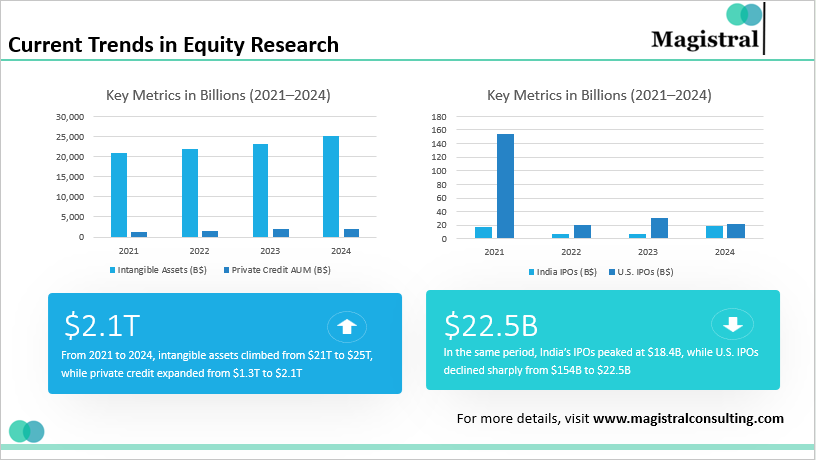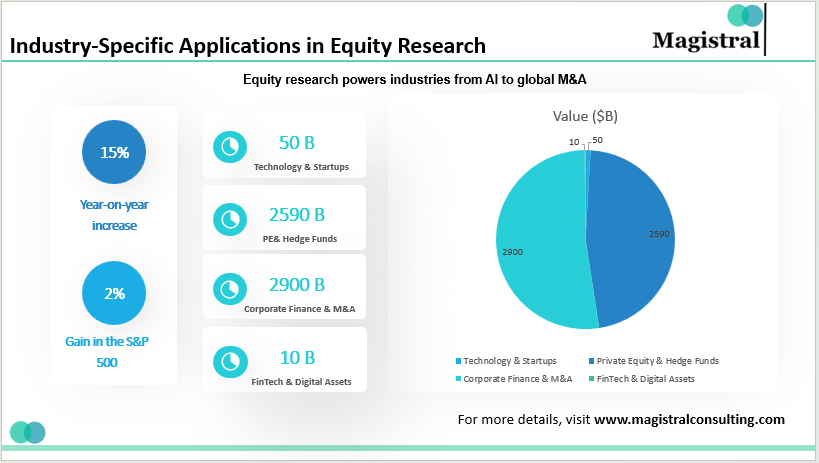The research for equity is thus more than simply a recommendation to “buy” or “sell”. It is the basis for capital allocation, fund strategy, and corporate growth planning. In a world shaped by market volatility, regulatory changes, and technological disruption, research enables investors to seize opportunities while managing risks.
The global equity market has evolved to be bigger and wider than ever in 2025. A company recorded that the total market capitalization for global equities reached $125.7 trillion in 2024, representing a 15.5% increase on a y-o-y basis. While this increase speaks volumes, it did so against the backdrop of a drying up of new listings. For context, 1,133 IPOs were raised in 2024, the lowest in five years. The stark contrast makes it very clear why equity research is so critical, really. While the market is growing, opportunities are being funneled into fewer but more dynamic pockets.
Equity Research Market Size & Momentum
Yet, despite the IPO slowdown, with only 1,133 IPOs worldwide in 2024 compared to 1,425 in 2023. Analysts still consider the global equity market bigger and much stronger in times of crisis. Total global equity market capitalization reached a whopping $125.7 trillion by December 2024, which accounted for a 15.5% increase on a year-on-year basis.
The global equity research market is anticipated to witness tremendous growth in the coming years. Said development has been an emergence of various driving forces over the past few years. Valued at around $9.5 billion in 2023, it is likely to reach $15.6 billion by 2030, thereby recording a CAGR of 7.2%. The growing demand for market analysis, data-driven insights, and investment decisions characterizes a fast-changing financial environment with a set course of action.
Active management is making a comeback. Less than 54% of active managers underperformed the S&P 500 in the first half of 2025, whereas this figure stood at 65 in 2024
Small-cap stocks thus delivered a fine performance in August 2025, outperforming their large-cap counterparts by a wide margin. The Russell 2000, which represents smaller publicly traded companies, posted an impressive 7% gains for the month. Comparatively, the S&P 500 index, which is mostly composed of large-cap stocks, has gone only up by 2%. This added outperformance of small caps came at a time when they continued at a significant valuation discount of approximately 26% to large-cap stocks. Cheap valuation combined with a renewed investor interest in economically sensitive sectors probably spurred the sharp rally of small-cap stocks.
Current Trends in Equity Research
Some of the recent trends observed in Equity Research are:

Equity Research AI
70% of global asset managers are already using AI for earnings forecasts, sentiment analysis, and screening, and the rate of adoption is expected to hit 90% by 2027.
Intangible Assets
In 2024, intangible assets of the S&P 500-other than software, IP, brands, and data contributed 90% to the market value of the companies, i.e., worth above $25 trillion.
Private Credit Expansion
Positioned to rise from $1 trillion in 2020-2024 to after $2.1 trillion by 2028-$2.8 trillion, an increase in the need for equity-linked debt valuation models.
IPO Activity
India led Asia Pacific IPOs in 2024, raising $18.4 billion (149% YoY growth), while U.S. IPO proceeds declined by 25% during the same period.
Data Insights & Analytical Techniques
Earnings Forecast Accuracy
Analyst consensus earnings estimate for 2024 U.S. equities were accurate within ±8% compared with ±15% a decade ago, with the intervention of AI models.
Sentiment Analysis
Nowadays around 65% of global hedge funds employ NLP to analyze earnings calls with the aim of predicting market reaction.
Investor Flows
EPFR data shows net inflows of $340 billion in 2024 into global equity funds, with 60 percent flowing into ETFs, thus forcing active managers to differentiate through research.
Industry-Specific Applications
Some of the industry-specific applications of Equity Research are:

Industry-Specific Applications in Equity Research
Technology & Startups
Equity research is vital in fundraising. It performs the vital function of validating the business model and building a reasonable case for market growth. Example: Global AI startups raised over $50B in 2024.
Private Equity & Hedge Funds
For transaction purposes, these banks work primarily with valuations: DCFs, LBOs, and comparable company valuation methods.
Corporate Finance & M&A
Global M&A volumes hit $2.9T in 2024, marking the period where equity valuation in due diligence became even more of a pressing need.
FinTech & Digital Assets
Equity research identifies risk and growth for 5,000-plus FinTech startups operating in India and for tokenized funds worldwide (~$10B AUM in 2024).
Why Consulting Firms Add Value
A consulting partner such as Magistral Consulting will lend equity research effectiveness:
Specialized Expertise
Analysts in the respective sectors, having advanced valuation skills.
Data-Backed Customization
Research reports customized to the portfolio of the client rather than the generic reports.
Speed & Efficiency
Offshore deliveries ensure cost savings of 30 to 50 percent, all while maintaining quality.
Risk & Compliance
Anticipating regulatory risks as they relate to disclosures about ESG and the intangibles’ issues.
ROI-Driven Results
Constitute better investment decisions resulting in better funds being raised and better market positioning.
In the $125T global equity space, equity research has gone from being “nice-to-have” to a strategic imperative. Whether uncovering undervalued stocks in emerging markets, analyzing India’s IPO wave, or integrating ESG, data-driven research is the only way forward. Specializing in particular verticals by blending deep expertise with delivery capabilities. It has enabled Magistral Consulting to help clients leverage data for decision-making, alpha, and growth.
Services Offered by Magistral Consulting for Equity Research
At Magistral Consulting, we offered customized research services for sell-side and buy-side clients through a modular engine catering to the challenges of today:
Fundamental Analysis
Magistral delivers customized financial models, quarterly earnings reviews, detailed earnings call transcript analysis, and equity- and industry-themed research to facilitate investment decision-making.
Quantitative Analysis
Data management includes cleansing, mining, and classification, whereas, advanced data analysis manages statistical analysis, correlation, and regression. Tracking and evaluating commodities are also included.
Credit Analysis
We offer country- and company-level risk assessments to support a risk-aware investment approach.
Content Marketing
Magistral supports outreach with industry-focused research encompassing industrial reports, index tracking, and analysis of events and news developments.
About Magistral Consulting
Magistral Consulting has helped multiple funds and companies in outsourcing operations activities. It has service offerings for Private Equity, Venture Capital, Family Offices, Investment Banks, Asset Managers, Hedge Funds, Financial Consultants, Real Estate, REITs, RE funds, Corporates, and Portfolio companies. Its functional expertise is around Deal origination, Deal Execution, Due Diligence, Financial Modelling, Portfolio Management, and Equity Research
For setting up an appointment with a Magistral representative visit www.magistralconsulting.com/contact
About the Author

Nitin is a Partner and Co-Founder at Magistral Consulting. He is a Stanford Seed MBA (Marketing) and electronics engineer with 19 + years at S&P Global and Evalueserve, leading research, analytics, and inside‑sales teams. An investment‑ and financial‑research specialist, he has delivered due‑diligence, fund‑administration, and market‑entry projects for clients worldwide. He now shapes Magistral Consulting’s strategic direction, oversees global operations, and drives business‑development support.
FAQs
What does “equity research in the financial services industry” mean in 2025?
Is passive growth somehow killing the research?
Regulatory changes are to fix small-cap coverage, yes?
Does research on stocks still matter with passive investing holding sway over the market?
How is technology changing equity research in the coming years?

